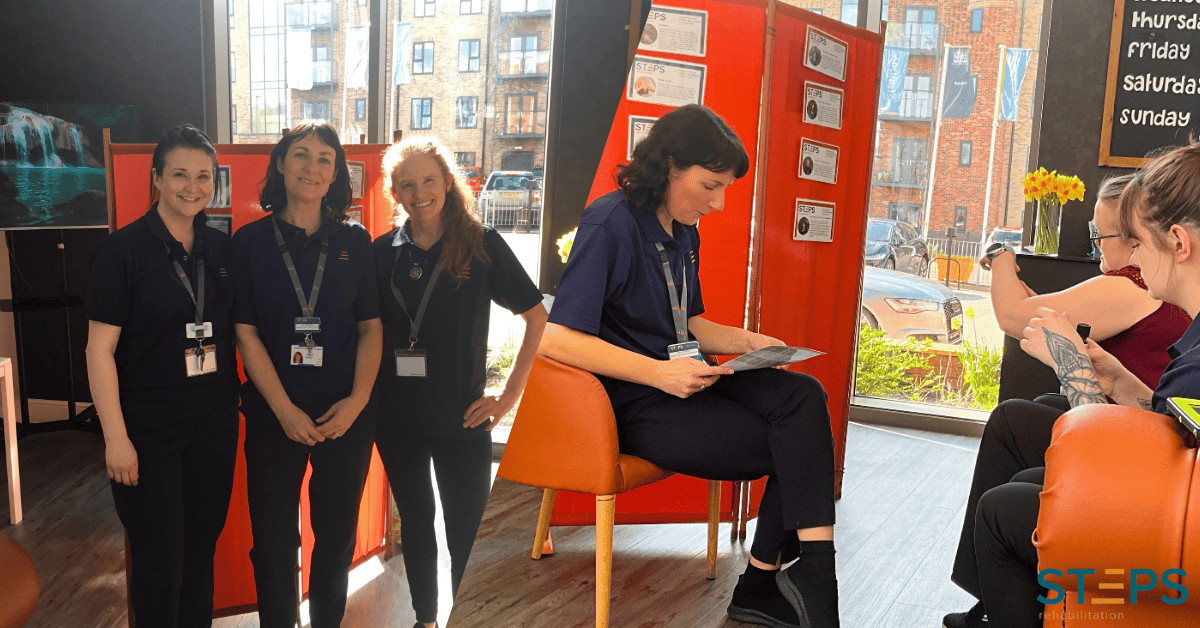Complementary Therapy Week aims to raise awareness of complementary therapies, their benefits and how they can be used to improve physical and mental wellbeing.
At STEPS Rehabilitation, we offer a range of complementary therapies to support the recovery of our clients. These complementary therapies are used in conjunction with traditional rehabilitation interventions, such as physiotherapy, occupational therapy and speech and language therapy. We also use cutting-edge rehabilitation technology. We believe the combination of all of these treatments provides our clients the best opportunity to achieve their goals and improve their overall wellbeing.
In this article, Jessika Sheppy discusses Solution Focused Hypnotherapy, how she uses this treatment at STEPS and how this complementary therapy is supporting clients in their rehabilitation journey.
Hypnotherapy at STEPS Rehabilitation
Hypnotherapy is the therapeutic use of hypnosis to help individuals achieve their goals and improve their overall well-being. It is recognised as a useful tool in neurological rehabilitation for clients recovering from conditions such as a stroke, traumatic brain injury or multiple sclerosis.
Jess practises ‘Solution Focused Hypnotherapy’ this combines psychotherapy with hypnosis in a collaborative way. The therapy is short term and goal focused and incorporates positive psychology principles and practises to help clients instigate change by constructing solutions rather than focusing on problems.
During a session, clients are guided into a state of trance, which is a relaxed and focused state of consciousness. During trance, the individual is more receptive to suggestions and can make changes at a subconscious level. The subconscious level is responsible for automatic behaviours, emotions and beliefs. By accessing this subconscious mind, the client can be helped to make changes and adopt new positive solutions.
Equipping clients with these resources and tools, can help clients to feel in control again at a time when their lives can feel exactly the opposite.
STEPS clients can have one to two sessions of SFH a week depending on what the treatment is for; one session could focus on pain relief, the other could be to promote natural sleep. Some sessions are more active using Neuro Linguistic Programming (NLP) techniques to re-programme habits and behaviours.
Benefits of Hypnotherapy
1. Reduce pain intensity and improve pain coping skills.
2. Improved motor function performance and reduce spasticity.
3. Improved cognitive function including attention, memory and executive function.
4. Reduced anxiety and depression
5. Improved sleep quality
Client A survived traumatic brain injury alongside an upper limb amputation was suffering with nerve and phantom limb pain which was causing his body considerable daily stress which meant he was suffering with insomnia. By learning to relax and tell his body a different message, that he was safe and that he could control his pain while he was relaxed allowed the flood of cortisol and adrenalin to gently reduce. Hypnotherapy worked alongside deep breathing techniques, massage and the introduction of a daily mindfulness routine to broaden the holistic experience.
Client B suffered a TBI and chronic pain following an accident, he was also suffering from very low on self-esteem and a lack of confidence in his own abilities; the accident had made him feel like a failure and overly reliant on family members for support. He was struggling to sleep with symptoms of PTSD keeping his awake and on high alert. The neuro education around stress was useful for this client and the solution focused approach helped him to see a life beyond his immediate situation for the first time. The positive change was having a chemical affect in the brain, and this was embedded further with the use of hypnosis. This improved his capacity for logical thinking as he was not constantly overwhelmed. The introduction of breathing and grounding allowed the PTSD symptoms to be managed in the moment and his sleep improved as a result.

Client feedback
“Jess explained everything, and it allowed me to understand my problem and she showed me a way to control my emotions, manage my stress and help me to relax. This helped me to sleep at night. I found the audio and breathing exercises really useful”.
“Jess is very useful to me; to relieve the pain in my leg and to relieve any kind of worrying in my life.”
“I think that SFH has partly been responsible for my mental state being what it is today from what it was before my arrival at STEPS. My SFH sessions have helped me become calmer and relaxed during probably the most difficult time of my life. Jess has a very understanding nature and has the ability to relax me and on a couple of occasions sent me to sleep! SFH is a massive part of my rehab and I am fortunate to have such a focused and caring person to bring it to me”.
Most clients do not realise how much stress and trauma their bodies are carrying until we ask them to relax and let go and it can be a powerful healing experience and the start of them starting to accept and adapt to major life changes in a calm and solution focused way.
Overall, solution focused hypnotherapy can be a useful tool for individuals undergoing neurological rehabilitation. It can help manage symptoms, improve motor and cognitive function, and reduce anxiety and depression.
Other complementary therapies used at STEPS as part of our rehabilitation programmes can include massage, aromatherapy, acupressure, acupuncture, mindfulness and tai chi and yoga.
